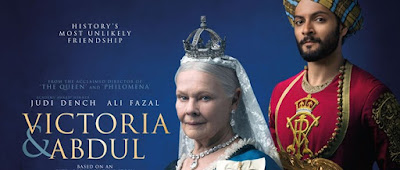Victoria and Abdul (Dir. Stephen Friers, 1h46m)
Biopics are a strange beast, it must be said, and I've covered quite a few over the last few months-in one camp you can have work that approaches its subject matter in an interesting way, either looking at a short period of their life, a point around which, for example, the case of Jackie, their life pivots, or approaches their subject in an unusual or fresh manner, giving an unflattering, warts n all portrait of their subject. And then there are films that remains slavish to its subject matter, file off the edges of the less scrupulous elements of their subject, and leaves one wishing for a more nuanced take on the true story that underpins it. Whilst Victoria and Abdul, acting as a sequel to fellow "Royalty and Commoner" picture Mrs Brown, is a perfectly watchable film, its one that sadly remains beholden to the pomp and circumstance of the British Empire.
At the centre of this film stands our principle duo of Queen Victoria (Dame Judy Dench, reprising her role from the aforementioned Mrs Brown), who plays Victoria as every inch the cantankerous, "We are not amused" stereotype that we've come to rather expect from portrayals of Victoria-where Dench does develop Victoria from this stereotypical caricature is both in her loneliness, a key theme in the previous film, but developed here, to almost painful intensity, but also in her humour. Whilst this film does lean on the comic side, in no small part due to the culture clash between Victorian England and Raj India, (but also due to the baroque intricacies of the Royal households), Victoria is often shown as playful, dogmatic and dismissive of the veritable entourage of hangers-on and court in general-in one early scene, she's shown eating with her hands, and racing to eat so that the plates of her subordinates are whisked away before they have finished.
Sadly, whilst Victoria is fleshed out from her typical appearance to a woman equally power-hungry and tired of serving; a veritable contradiction she may be, but compared to Abdul, (played by Ali Fazal), at least she's a realistic contradiction. Abdul, sadly, is a rather two dimensional character-whilst the grit of Connolly's Mr Brown, the controlling but caring man who attempted to keep the Queen safe made the first film a resounding success, Abdul is, for lack of a better word, bland. Whilst he's certainly likable, playing an initial fish-out-of-water in the cold, rather inhospitable Great Britain, this is a note that the film repeatedly pokes at for most of the film. Oh! Isn't the UK cold? Oh! Aren't the British casually racist? Oh! Isn't the Queen an awfully lovely person who has to put up with all these terrible people telling her how to run the country?
The other major problem remains throughout the film, even to its rather overdrawn denouement, (this film seems to end more than Return of the King), just how untroubled Abdul seems to be by the British empire and the level to which he is almost blindly subservient he remains despite the trust the Queen has in him. Whilst Prince Albert (a rather bored-seeming Eddie Izzard) and the rest of the Royal Household charge Abdul as being a bad influence at multiple points, aside from a few cultural eccentricities he barely seems to have any impact upon her-indeed, such is the unevenness of this film, Abdul's rise through the Royal Household seem to be more due to the doting of a woman increasingly lonely and isolated rather than his own cunning.
At the centre of this film, however, remains the question of the Empire-at many points Abdul regards both himself and the Queen as servants, and as a result the entire film shows him as a figure who is essentially almost slavishly beholden to the idea of continued British Rule over India-this is thematically worrying to say the least, especially given the more complex background that Abdul as a historic figure seems to have-the real Abdul, for example, may have influenced Victoria over policy, and clearly had an excellent idea of the way in which he could gain power, seeking the Indian equivalent of a peerage, and certainly as a historical individual, he was far more complex than the two dimensional, slavish and sadly fictionalised caricature that we get here. Indeed, aside from Dench's admittedly entertaining Victoria, almost every member of the cast are either underplayed or reduced to a single-note role.
Thus, Victoria and Abdul seems, sadly, an over-simplified, rather disappointing film, not only due to its mis-management of a fascinating meeting of cultures in the characters of Victoria and Abdul, but also questioning the exact idea of servitude and empire, but in its overall presentation and story-telling. One day, I hope, this story can be brought to life in a more nuanced and more effective way
Rating: Neutral.



Comments
Post a Comment